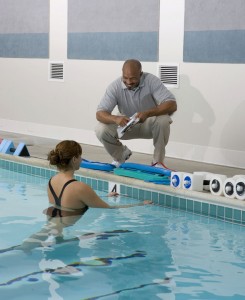 Aquatic Physical Therapy is the evidence-based and skilled practice of physical therapy in an aquatic environment by a physical therapist, or a physical therapist assistant under the supervision of a physical therapist. Aquatic Physical Therapy includes but is not limited to treatment, rehabilitation, prevention, health, wellness and fitness of patient/client populations in an aquatic environment with or without the use of assistive, adaptive, orthotic, protective, or supportive devices and equipment.
Aquatic Physical Therapy is the evidence-based and skilled practice of physical therapy in an aquatic environment by a physical therapist, or a physical therapist assistant under the supervision of a physical therapist. Aquatic Physical Therapy includes but is not limited to treatment, rehabilitation, prevention, health, wellness and fitness of patient/client populations in an aquatic environment with or without the use of assistive, adaptive, orthotic, protective, or supportive devices and equipment.
The unique properties of the aquatic environment enhance interventions for patients/clients across the age span with musculoskeletal, neuromuscular, cardiovascular/pulmonary, and integumentary diseases, disorders, or conditions.
Aquatic Physical Therapy interventions are designed to improve or maintain:
- Function
- Aerobic capacity/endurance conditioning
- Balance, coordination and agility
- Body mechanics and postural stabilization
- Flexibility
- Gait and locomotion
- Relaxation
- Muscle strength, power, and endurance Interventions used in Aquatic Physical Therapy include, but are not limited to, therapeutic exercise, functional training, manual therapy, breathing strategies, electrotherapeutic modalities, physical agents and mechanical modalities using the properties of water and techniques unique to the aquatic environment.
Abbreviated Definition of Aquatic Physical Therapy:
Aquatic Physical Therapy is the scientific practice of physical therapy in an aquatic environment by physical therapists and physical therapists assistants. Aquatic Physical Therapy includes but is not limited to treatment, rehabilitation, prevention, health, wellness and fitness of patient/client populations in an aquatic environment. The unique properties of the aquatic environment enhance treatments for patients/clients across the age span with musculoskeletal, neuromuscular, cardiovascular/pulmonary, and integumentary (skin) diseases, disorders, or conditions.
Abbreviated Definition of Aquatic Physical Therapists:

Pediatric Aquatic Therapy
Aquatic Physical Therapists are licensed physical therapists who perform an examination and evaluation to establish a functional diagnosis, prognosis for functional recovery, and need for PT treatment with a plan of care. Aquatic Physical Therapists and Physical Therapist Assistants provide PT treatments in a safe aquatic environment taking into consideration transition to land based functional activities and communication with the patient-care team.
This information is provided by: